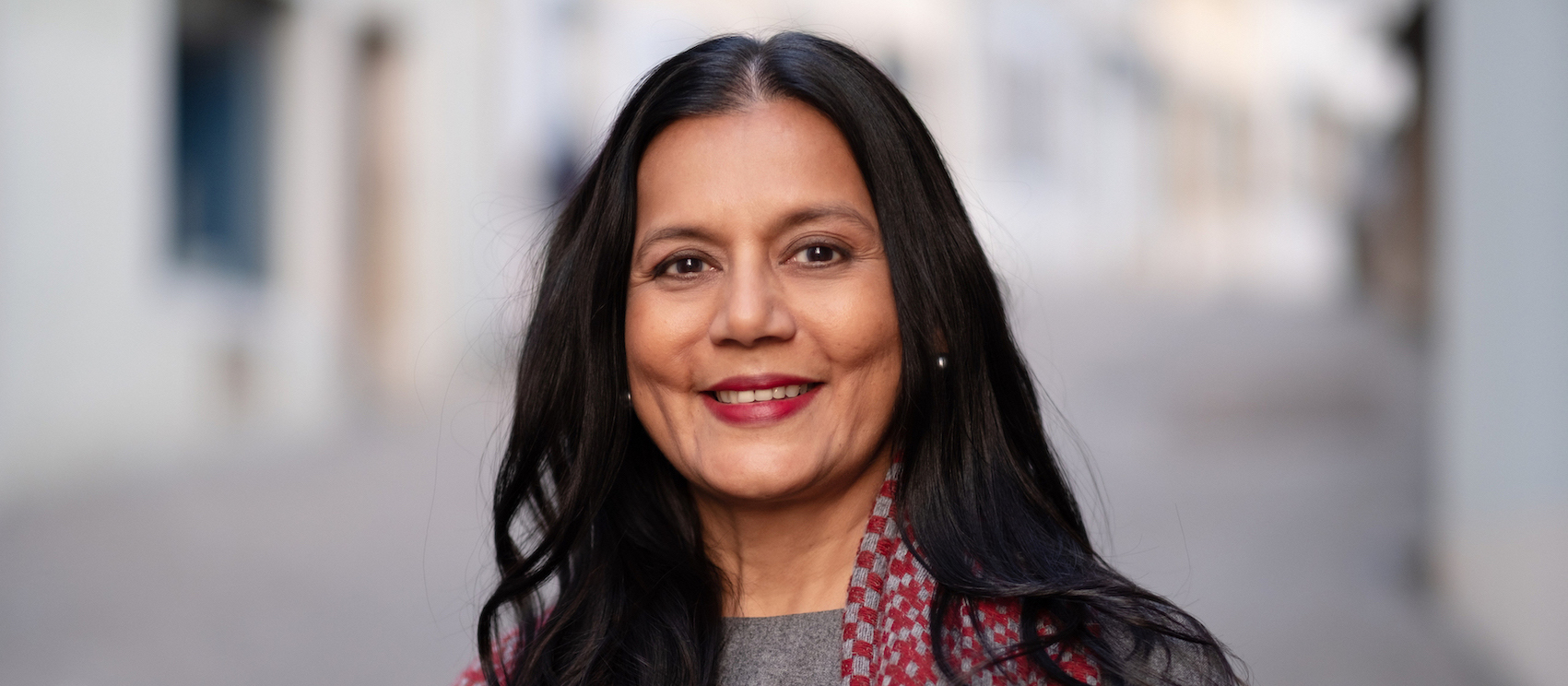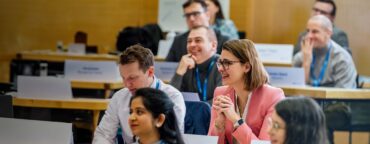
Smita Suchde Gruetter (EMBA 2016) credits her parents for a great deal. From her mother, she says she inherited a desire to help others and a passion for education. Her father instilled in her an entrepreneurial zeal that has seen her create multiple businesses, from fashion and textiles to travel and social enterprise.
Both sets of qualities have been essential in building HEMLATA, a social innovation enterprise named after her mother, and established in 2002 to improve the lives of women from the lowest socio-economic class in India.
“My father has been a very successful entrepreneur. And he worked extremely hard. This was one of the qualities that was imbibed in me from a very young age. And hard work is certainly super important to achieving your dreams,” she said.
Of her mother, who passed away in 1990, she added, “My mother was very empathetic, altruistic, and a complete giver. She always helped people around her. I don’t remember a single instance where mom saw somebody in need and didn’t give something.”
An international education
Encouraged by her mother, Suchde Gruetter was fortunate to have a broad international education. She earned her degree in economics and political science from Mumbai University before studying law and then gaining a diploma in fashion and apparel design in New York. She has since worked as a buyer for a glass and porcelain company in Zurich and as a brand strategist and marketeer for a local water company, and has built an event management company as well as founding a fashion business and a travel company offering thoughtfully designed trips to India.
Throughout all this, Suchde Gruetter remained acutely aware that many women in India did not have the same opportunities as she did. Despite the 2009 landmark Right to Education Act that made education free and compulsory for children between the ages of 6 and 14, many girls are still forced to drop out to help with the household and younger children.
Although the number of girls in school has increased in recent years, 7.1% of girls aged 15-16 were not enrolled in education in 2021, according to India’s Annual Status of Education Report.
A time for reflection
Until 2018, HEMLATA focused on funding philanthropic activities around women and children in India. These included several projects focused on education, sports, health, and wellbeing.
In one particular project, providing English and math classes for girls from economically vulnerable families studying in a vernacular school, Suchde Gruetter became frustrated that many girls, in spite of this support, would not attend classes.
“We realized that, coming from the lower economic strata, these girls had eaten before school, but had little to no lunch, and were hungry by the time school ended so wanted to go back home. They didn’t want to stay after school for English and math classes. So, we started providing food as an incentive to stay, study and learn,” she explained. “Some of the girls didn’t come to school when they didn’t have the bus fare. So, we started providing money for transport. But in this process, while speaking to the girls, we also realized that not every girl who went to school wanted to pursue higher education.”
It was around this time that Suchde Gruetter decided to hit pause to reflect on HEMLATA’s next chapter. Many of HEMLATA’S projects across two decades of work had involved building infrastructure, such as water wells, a library, and a bakery, and all needed to be maintained by the community. Living in Switzerland, Suchde Gruetter was reluctant to further invest into infrastructure projects and wanted to concentrate on impact that could be measured across regions.
As part of her period of reflection, she enrolled in an executive MBA at IMD which gave her the chance to think about HEMLATA not just as a philanthropic project but as a social innovation enterprise creating impact.
A holistic approach
It was soon after completing her EMBA that she decided to pivot HEMLATA’s work from providing infrastructure to focusing on being human-centric.
In particular, she noticed that while a lot of effort was being put into getting girls to complete their schooling, there weren’t many organizations focused on higher education after school. A lack of financial stability means many girls unable to pursue higher education will either work in menial jobs or get married. According to UNESCO, the female gross enrolment ratio for tertiary education in India was 31%, compared to 92% in North America and Europe.
“I concluded that the best way is to have a very holistic method where we take children from India’s lowest strata and provide them with similar opportunities to what we would provide to our own children. If we ask ourselves, what do we want our children to be? We want them to be well educated, have a good mentor, find a good job, be participants in society. We want to provide the best we can for them,” she said. “Hence, should we not provide these young people, with less privilege and from the lower economic strata, the same? We need to allow for equity before equality.”
Suchde Gruetter wanted to provide support to young women who graduated from school with the grit and determination to go onto college to help them break their cycles of intergenerational poverty.
A philanthropic pivot
She decided to pivot, so set up HEMLATA’s H100 Impact Academy, a social innovation project aimed at supporting 100 girls from India’s lowest socio-economic class with quality, tertiary education in accredited colleges in India, with a full scholarship. The H100 scholarship is all-inclusive – providing tuition, lodging, meals, a laptop, or a tablet, and even a stipend for pocket money.
The H100 Impact Academy is built on its five pillars of sustenance. Along with the scholarship as pillar one, mentorship is its second pillar. Each scholar is accompanied throughout her college journey by a mentor from outside of India to allow for different perspectives. A life skills program with non-cognitive skills such as problem solving, interpersonal relationship skills, empathy, and coping with stress and emotions, is its third pillar. Learning and development with inter-disciplinary skills and career skills make up the fourth and fifth pillar respectively.
As of 2023, HEMLATA has collaborated with IMD coaches, headed by Susan Goldsworthy, Affiliate Professor of Leadership, Communications and Organizational Change, to support HEMLATA’s Life Skills program, the H100 scholars, and their mentors in their life skills journey.
Scholars supporting future scholars
Suchde Gruetter’s vision is to invest in 100 girls by 2025. This goal has been complicated by the COVID-19 pandemic which slowed the admissions process at many universities. As of 2022, 20 girls have been enrolled in the program and Suchde Gruetter is still sticking to her target, hoping to add between 25 and 30 new scholars per year over the next three years.
Since 2020, the HEMLATA‘s H100 Impact Scholarship has been refined to a unique giving model of two-thirds philanthropic contribution and one third returnable grant to create sustainable impact.
Once a graduate scholar secures a full-time job and earns a taxable income, she contributes by returning one-third of the total scholarship. This amount of returnable grant is rolled back into the program, creating a fund to be used solely towards supporting future H100 Scholars. This way, three graduates of the program can support one future H100 scholar, ensuring the program continues to grow.
At the same time, by joining the professional ranks and becoming taxpayers, HEMLATA graduates are able to contribute to society as a whole and gain a sense of dignity and self-worth.
Running the project like a startup
Suchde Gruetter credits her time at IMD with giving her the ability to view the entire project like an enterprise – from raising funds, to building a strong team aligned with its purpose, to scale and growth.
“We’re trying to see how do we grow this to make it 100? And then how do we get to 1,000? And how do we go to 10,000 from there? Hopefully, the more girls we will have in the program, we will also have the girls supporting the project,” she explained.
HEMLATA is run by a small team of women volunteers in India and Switzerland. Suchde Gruetter views her role as providing transparency, bringing in ideas and funding, and importantly, empowering each team member in their individual roles to stay aligned to their shared purpose.
“As a leader, you’ve got to be able to create an environment where you find people to manage a specific role, align them with the mission and vision, and then let them be responsible for their role, 100%,” she said. “Once the direction has been set, HEMLATA project leads have the freedom to build their own programs and structures. I support them to fine-tune and align their plans to our larger goals.”
A template for other countries
Suchde Gruetter’s ambition is for the H100 program to act as a pilot specifically in India, after which she hopes to take this template and apply it to Latin America, Africa, and Southeast Asia to provide young women with quality tertiary education.
“The scaling comes from collaboration and hopefully finding other organizations that want to use this model in their own countries,” she explained.
Long term, Suchde Gruetter wants to make HEMLATA as independent from her as possible. Once HEMLATA has achieved scale, she would like to use her leadership skills to work in a collaborative way with organizations and government across social entrepreneurship in India and elsewhere.
‘The impact is immeasurable’
So how does HEMLATA measure the impact of their scholars?
One way, said Suchde Gruetter, would be to measure how many girls go on to work for top companies in India. For example, H100 Alumni are working in companies like Zest Money, ABInBev, and Fidelity, with one scholar recently being offered a position with Deloitte.
At the same time, she believes you have to consider the broader benefits. “We are supporting at least 100 people already, instead of just 20 girls, because we are providing impact to their families. Not only do the alumni scholars support their own families, but parents are better able to support themselves. Since families don’t have costs for their daughters’ boarding and food, they can now spend this money on other necessities.”
Still, Suchde Gruetter believes most of the impact is immeasurable. “Education should not be measured in just numbers,” she said.
While it’s possible to crudely count grades and the number of children who graduate in certain subjects, she believes the biggest impact comes from providing each girl with a sense of dignity and self-worth, and by enabling them to earn their own financial independence.
“When you see the difference in the girl from when she enters and graduates form the program, for me, that is real sustainable impact – because what we’re doing is in essence, building their dignity and confidence,” she said.
She compares the transformation the girls undergo to her own experience completing an executive MBA at IMD.
“When I came out of those two years, I felt I was grounded, and that I’d done something which had added to my character, my personality, and to my life goals – and I think in part, this is similar to what we’re doing now.”


